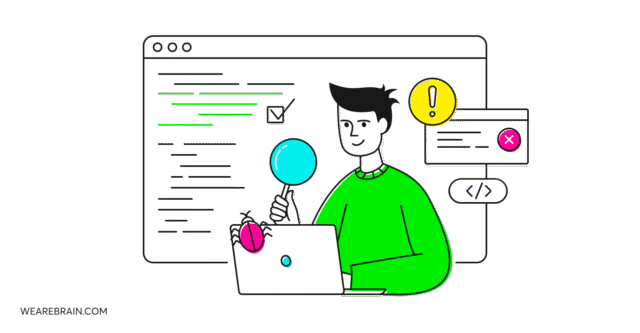
Both junior and seasoned developers understand that debugging represents one of the most intellectually demanding yet transformative aspects of the development journey. The art of identifying and resolving errors within code to ensure software functions as intended embodies the very essence of purposeful problem-solving in our technological ecosystem.
Debugging techniques and tools serve as the unsung catalysts of innovation in the coding world, empowering developers to diagnose and resolve challenges that could otherwise compromise software reliability, performance, and security.
With an expanding universe of software debugging tools available, the global debugging software market reached $638.1 million in 2023 and is projected to grow to $1.75 billion by 2030, making the strategic selection of the right tool more crucial than ever for maximizing development potential.
Factors to consider when choosing a debugging tool
Selecting the optimal debugging tool transcends simple feature comparison. It requires understanding your specific development aspirations, the programming languages that fuel your innovation, and the collaborative environment where your creativity flourishes.
Here are key considerations for making an informed choice that amplifies your development potential:
Complexity and AI integration
Modern debugging tools in 2025 increasingly leverage AI-driven insights to provide intelligent error pattern analysis and suggest fixes automatically. Tools now use AI to reduce debugging time by up to 40%, with platforms incorporating machine learning to enhance error analysis capabilities. This represents a fundamental shift towards proactive, data-driven debugging approaches.
Usability and collaborative features
Whether you’re pioneering new solutions or refining existing architectures, user-friendliness remains paramount. Real-time collaboration features have become standard, supporting distributed teams and remote work environments where developers need to solve challenges together. Tools with intuitive interfaces and seamless collaborative capabilities save valuable time and eliminate frustration.
Price and value alignment
The cost spectrum of debugging tools varies significantly, from open-source solutions that democratize access to premium platforms requiring strategic investment. With 75% of professionals preferring tools with user-friendly interfaces and seamless integration, your budget considerations should align with long-term value creation.
Integration and cloud capabilities
Cloud-based debugging solutions have gained substantial momentum, offering developers the flexibility to debug applications from anywhere while providing powerful capabilities without extensive local resources. Seamless integration enhances workflow efficiency and transforms debugging into a more collaborative, accessible process.
Community support and continuous learning
When challenges arise, having access to comprehensive resources, educational materials, and a supportive community becomes invaluable. Evaluate whether your chosen debugging tool has an active user community, extensive documentation, and evolving educational resources to support your continuous growth.
Best software debugging tools in 2025
1. AI-Enhanced Visual Studio Debugger
Best suits: Windows developers, .NET framework, C++, AI-powered development
Price: Free with Visual Studio Community, advanced features in paid versions
Microsoft’s Visual Studio Debugger has evolved into an AI-powered debugging ecosystem that provides intelligent breakpoint suggestions and automated error pattern recognition. The tool supports extensive programming languages, including C++, C#, and F#, while offering advanced features like AI-driven variable inspection and predictive debugging capabilities.
2. Next-generation GDB (GNU Debugger)
Best suits: C, C++, Fortran, and RISC-V developers
Price: Free
The GNU Debugger has significantly enhanced its RISC-V support as silicon vendors increasingly adopt this architecture. This robust, command-line debugging tool provides powerful capabilities including advanced breakpoint management, intelligent variable inspection, and sophisticated code stepping. Its evolution supports modern development practices while maintaining its open-source accessibility.
3. Advanced LLDB with AI Integration
Best suits: LLVM ecosystem developers, Swift, modern C++
Price: Free
LLDB continues to evolve with the LLVM project, now incorporating AI-assisted debugging features that help developers identify optimization opportunities and performance bottlenecks. This open-source debugger offers enhanced multi-thread debugging, intelligent expression evaluation, and comprehensive disassembly views.
4. Enhanced Chrome DevTools with Real-Time Collaboration
Best suits: Web developers, progressive web applications, real-time debugging
Price: Free
Chrome DevTools has transformed into a collaborative debugging platform that supports real-time team debugging sessions. It offers revolutionary features for live DOM inspection, advanced network monitoring, and sophisticated JavaScript performance profiling, making it essential for modern web application development.
5. PyCharm Debugger Pro with ML Debugging
Best suits: Python developers, data science, machine learning projects
Price: Free community edition, advanced features in paid versions
PyCharm Debugger now offers specialized scientific debugging modes optimized for data science and machine learning projects. The enhanced platform provides intelligent code analysis, advanced variable visualization, and integrated support for popular ML frameworks, transforming how Python developers approach complex debugging challenges.
6. Emerging AI-Powered Tools: CodeRabbit AI & Snyk Code
Best suits: Enterprise teams, security-focused development, automated code review
Price: Subscription-based
CodeRabbit AI excels in automated code reviews at scale, providing contextual comments and architectural risk analysis. SnykCode offers real-time AI-powered bug detection, catching security vulnerabilities and code quality issues as developers type, representing the future of proactive debugging.
Time to choose
Debugging represents a continuous opportunity for growth and innovation in the development process. The strategic selection of debugging tools can profoundly impact your development workflow and the quality of solutions you create.
When making your decision, consider your technical aspirations, collaborative preferences, and long-term development goals. With 80% of professionals noting that modern debugging tools streamline their workflow, choosing the right partnership becomes an investment in your creative potential and professional excellence.
The right debugging tool becomes more than software, it becomes your collaborative partner in transforming challenges into opportunities, bugs into insights, and code into meaningful impact.
